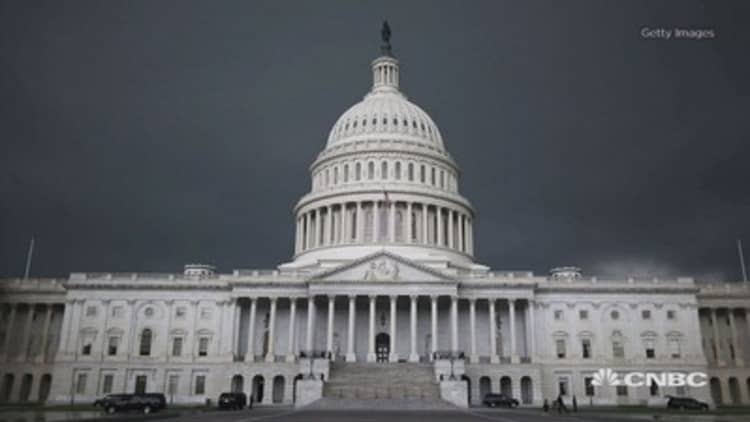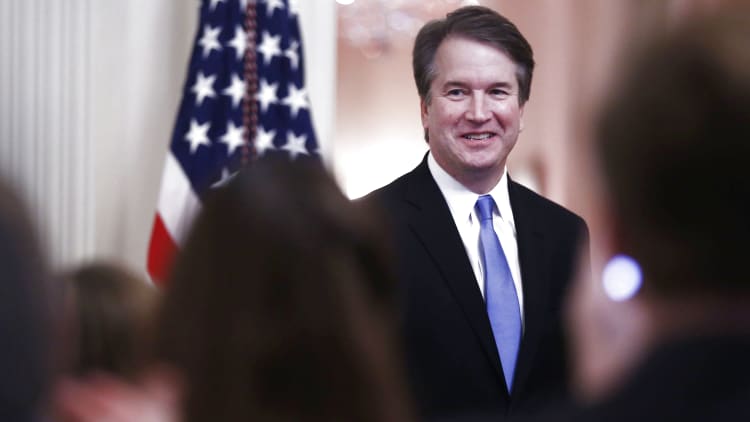Several progressive organizations demanded Tuesday that Justice Brett Kavanaugh recuse himself from an upcoming Supreme Court case over the constitutionality of the Consumer Financial Protection Bureau, the post-crisis financial regulator, because he declared the bureau's structure unconstitutional while he was a federal appeals court judge in Washington.
The groups argued that Kavanaugh will not be able to rule impartially in the case, Seila Law v. CFPB, because he has already gone on the record with his views in a case that presented a nearly identical legal question. Kavanaugh wrote that the CFPB's single-director structure was unconstitutional in a 2016 opinion and a 2018 dissent.
"We call on Justice Kavanaugh to recuse himself from hearing a case on which he has already made up his mind," the groups — Demand Justice, Demand Progress Education Fund, the Revolving Door Project and Allied Progress — wrote in a statement.
"The law clearly states that judges should recuse themselves when their impartiality might reasonably be questioned. Brett Kavanaugh has already ruled on the underlying legal question in this case. He cannot plausibly claim to be open to arguments from both sides," they wrote.
Read more: A voter who could be key to Elizabeth Warren's 2020 hopes? Justice Brett Kavanaugh
The case is scheduled to be argued in early March. The challenge to the bureau was brought by Seila Law, a California-based firm, which alleges that the independence of the agency's director runs afoul of the Constitution's separation of powers.

In an opinion for a panel of the U.S. Court of Appeals for the D.C. Circuit in 2016, Kavanaugh wrote that the "concentration of massive, unchecked power in a single Director marks a dramatic departure from settled historical practice and makes the CFPB unique among independent agencies."
The full court overturned his decision two years later, prompting Kavanaugh to pen a dissent that reiterated his belief that the agency's structure was unconstitutional. That case is known as PHH Corp. v. CFPB.
"In PHH, Kavanaugh offered a more than 70 page long dissent which he told the Senate constituted one of the most 'significant constitutional opinions' of his judicial career," the groups said. "Kavanaugh's personal reputational interest in seeing that bitter dissent against a bipartisan majority be vindicated by the Supreme Court is considerable."
The justices are not subject to the code of conduct that applies to lower courts, though they generally will not vote on a case if they directly worked on it. Federal law bars justices from hearing cases in which their "impartiality might reasonably be questioned."
But it would be atypical for a justice to step aside from a case that simply presents the same legal question as one that they have previously heard, according to Marty Lederman, a former Justice Department attorney who worked in the Office of Legal Counsel.
"Although of course I can't say for certain, I'm not aware of any case in which a Justice has recused because he or she has already written on the Question Presented in another case — something that happens fairly regularly," Lederman wrote in an email.
Chris Kang, the chief counsel at Demand Justice, said that the justices have wide latitude to decide which cases present conflicts for them. But he said the issue pointed to a "broader problem" about the lack of a Supreme Court code of ethics.
"I do think that this case, and this recusal question, folds into the broader question of the Supreme Court's legitimacy," Kang said in an interview.
"If a nominee can't discuss an issue in a confirmation hearing, in the most abstract terms, certainly that should apply here," Kang said.
The Democratic-controlled House of Representatives passed legislation earlier this year that would create a code of ethics for the Supreme Court. The legislation has little chance of becoming law, and experts have raised doubts about whether it could be enforced even if it did.
Gabe Roth, who runs the nonpartisan Supreme Court watchdog group Fix The Court, said that Kavanaugh should at least explain his decision not to recuse himself from the CFPB case.

"If you believe, as Kavanaugh does, that he's not required to step away from a case where we know what his beliefs are, then explain that to us," Roth said. "I like to think of these moments as teaching opportunities and don't necessarily impugn nefarious motives on the justices."
Fix The Court did not sign on to Tuesday's call from progressive groups. The group released a report, however, examining recusals and non-recusals so far this term that raised questions about Kavanaugh as well as Justices Ruth Bader Ginsburg and Sonia Sotomayor, two Democratic appointees.
The report noted that Ginsburg accepted a $1 million prize on Monday from the Berggruen Institute, a think tank, which she has directed to charity. Judges on lower courts are forbidden to receive honoraria of more than $2,000.
Ginsburg's prize appeared to be the first honorarium awarded to a justice over $2,000 since at least 2012, the group found.
Sotomayor, who was paid more than $30,000 in royalties by Penguin Random House last year, did not recuse herself from deciding whether to hear a case involving the publisher, according to the report. The court refused to take the case earlier this month.
"Look, tell us more and maybe we will feel better about your lack of bias in these issues," Roth said. He added that the justices comply with their ethical obligations "98% of the time" but that "each has made unforced errors."
None of the justices responded to a request for comment sent to a court spokesperson.
Kavanaugh has previously recused himself from a case involving the CFPB. He did not participate in deciding whether the court would hear a separate challenge to the CFPB, brought by a Texas bank, because he had written an opinion in the case as an appeals court judge.
The Supreme Court refused to hear the case in March. That decision came after the Justice Department noted in a brief that Kavanaugh would likely recuse himself and that justices "may wish to wait for a vehicle in which all nine Justices are likely to participate."
The justices agreed to hear the case brought by Seila Law in October. A decision in the matter is expected before the end of June.
If the justices declare the bureau's structure unconstitutional, they could limit the director's power without scrapping the agency entirely, and Kavanaugh has written in support of such a remedy.
A ruling against the CFPB would be a symbolic loss for presidential contender Sen. Elizabeth Warren, D-Mass., who first envisioned the agency while she was a professor at Harvard Law School and who was its architect in the Obama administration.
The CFPB, which became operational in 2011, returned $12 billion in relief to consumers by 2017, according to government figures. Its activity was curtailed after Trump took office, and in September, its Trump-appointed director, Kathleen Kraninger, said she believed the bureau was unconstitutional.



